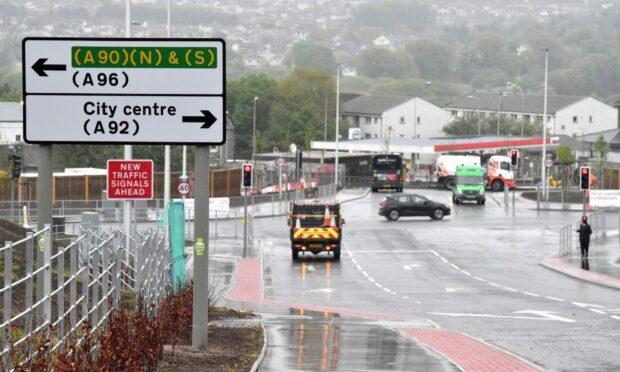Civil engineers heavily criticised the Scottish Government’s handling of the long-overdue A9 upgrade and called for the existing contract to be scrapped.
Members of the Civil Engineering Contractors Association claim they knew for years that the 2025 Perth-Inverness dualling promise could not be met.
In a stinging rebuke, sent to the Scottish Parliament, they branded government agency Transport Scotland as “the worst client to work for in the UK”.
The group blamed a “dated” bespoke contract which places all financial risk on the contractor for issues such as weather and ground conditions.
The body also claimed the type of contract could affect timescales for dualling the remaining nine sections of the A9.
They also claim the “glacial” pace has been deliberate because of a lack of available funding.
The upgrade will no longer be completed by 2025 as planned. An update is not expected until autumn on a revised target completion date.
The group’s submission comes one week on from the resignation of Transport Minister Kevin Stewart due to poor mental health.
As of Monday, the government had not named a successor.
Petition to dual A9
The group’s members include some of the largest construction firms working on large scale infrastructure projects in Scotland.
Laura Hansler, from Kincraig, a village south of Aviemore, launched the petition last year calling on the Scottish Government to fulfil its pledge to fully dual the route.
The submission by CECA said: “Transport Scotland’s desire to continue to specify their bespoke has resulted in fewer contractors viewing Transport Scotland opportunities as being attractive to bid.
“This is evidenced where Transport Scotland has only attracted one bidder on two separate occasions for a major project; the A92/A96 Haudagain improvement in Aberdeen in 2019 and again for the Tomatin to Moy section of the A9 earlier this year.
“They awarded Haudagain but rejected the sole bid for Tomatin to Moy.”
Instead, the engineering association wants the government to follow the wider industry who moved to using the “New Engineering Contract” in 1993.
They said this embeds a “more equitable sharing of risk between client and contractor”.
‘Glacial’ progress
The submission also states that the civil engineering sector in Scotland have “known for many years that the promise to dual the A9 by 2025 would not be met”.
It states that the pace of progress has been “glacial” and claims there is a “suspicion” amongst contractors that this is deliberate as there has been “insufficient budget”.
It was revealed earlier this year that the project to dual the A9 had been delayed again.
A bid to upgrade the Tomatin to Moy section in the Highlands was rejected over high costs and will have to go out to tender again.
Pressure is building on the government to get the A9 project delivered, following the death of 18-year-old Regan Johnstone on the section near Tomatin.
In 2022, 13 people died on the A9 stretch between Perth and Inverness.
SNP backbencher Fergus Ewing has long criticised his own government for their failure to dual the route, warning it could even be 2050 before the work is finished.
He described the evidence put forward by CECA as “compelling” and hopes the advice given to Transport Scotland will be “acted upon”.
The MSP for Inverness and Nairn said he will be seeking “assurances” from the incoming transport minister that funding for the project will be “accelerated”.
Jackson Carlaw MSP, Public Petitions Committee convener, said: “11 years on from the Scottish Government’s commitment to dual the A9, there is real frustration from communities who rely on this vital route that progress on this project has been so slow.
“Our consideration of the petition, with evidence from the petitioner and transport industry experts, will allow us to examine what next steps we can take ahead of taking evidence from the new transport minister when they are appointed.”
‘Decline’ in number of tenderers
Transport Scotland confirmed it remains “fully committed” to the dualling of the A9 between Inverness and Perth.
A spokesman added: “Transport Scotland has a long record of successful procurement which balances the need to attract competition from the market place with protecting the public purse.
“Whilst the design and build works contract has been successfully implemented for over 20 years, they do acknowledge that recent years have seen a decline in the number of tenderers, in part due to the terms and conditions set out in the contract, including risk transfer.
“A market engagement exercise has been undertaken with industry partners, including The Civil Engineering Contractors Association (CECA), to consider changes to better reflect current market conditions and risks to maximise interest and competition ahead of the new procurement for the A9 Dualling: Tomatin to Moy project.
“Transport Scotland welcomes CECA’s contribution as an interested party as it considers the most appropriate approach to balancing the need to generate effective tender competition with the importance of protecting the public purse.
“This is a complex process, and we need to carefully guard against any unintended consequences.”



Conversation